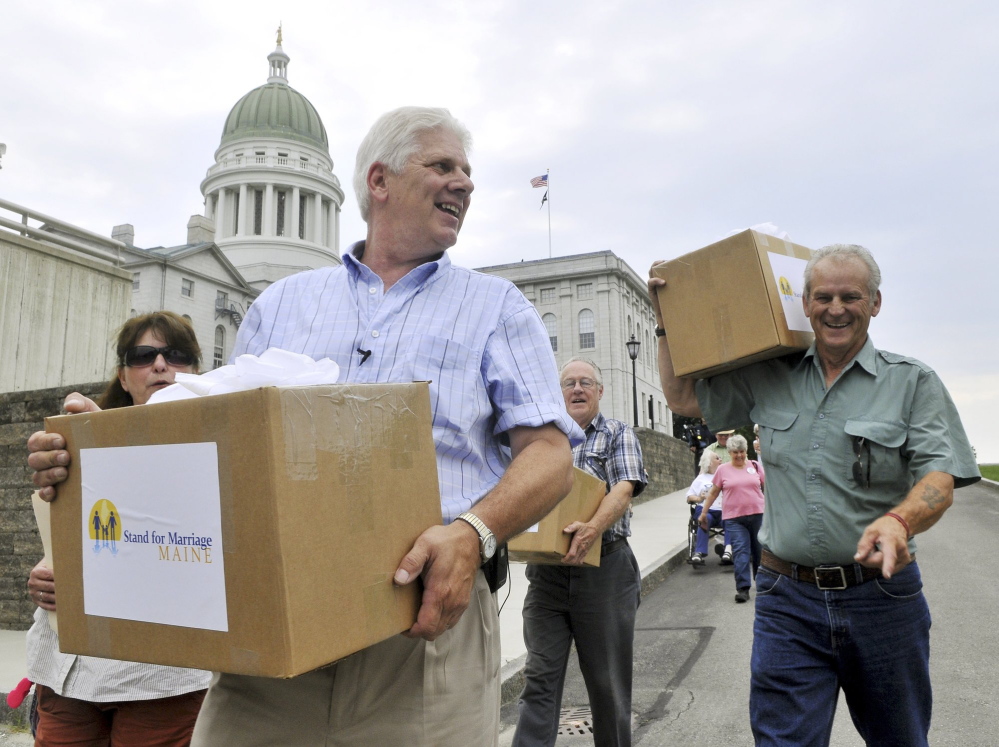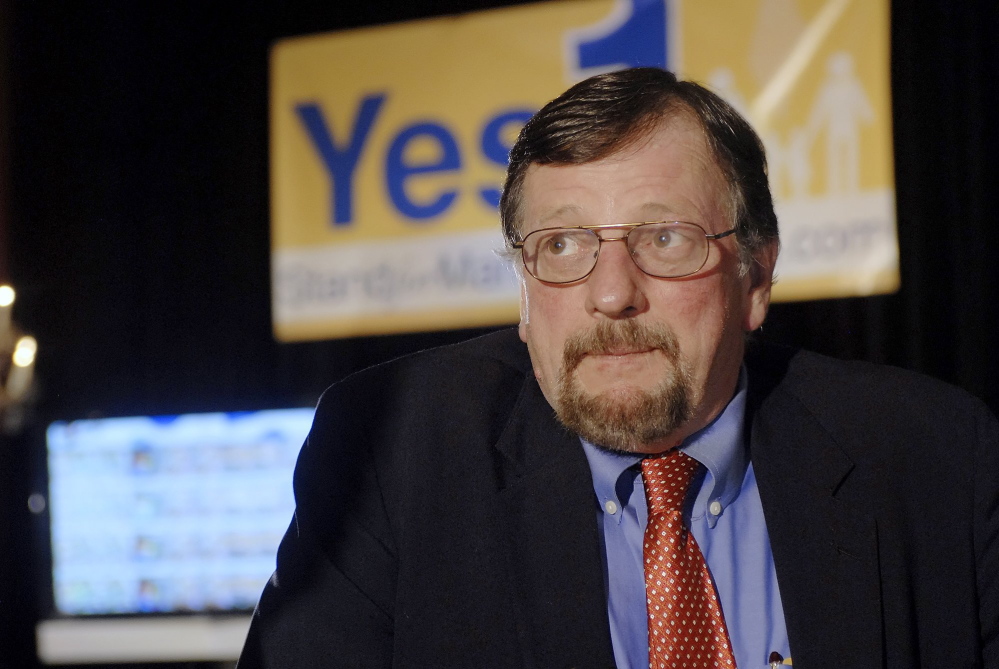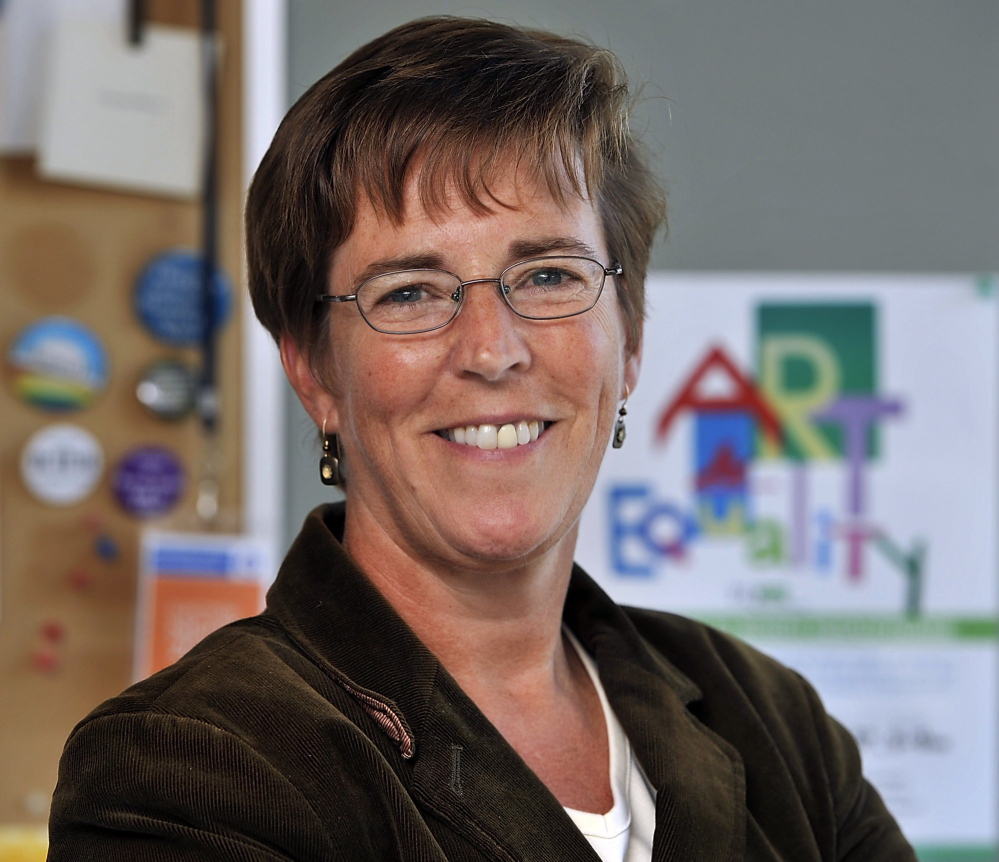When they volunteered for the 2009 campaign to defend Maine’s fledgling same-sex marriage law, Steve Ryan and Jim Bishop were taking a risk.
Looking back, they think the people who helped to take away their right to marry should have done the same.
The Saco couple worried that their standing in the community would suffer if their involvement was made public. They own a business renting apartments.
“We knew our names would be out there,” Ryan said. “People could break our windows, harass us, all sorts of things.”
That wasn’t true for the donors to the National Organization for Marriage, whose identities are a secret – at least for now.
In 2009 the nation’s leading group opposing same-sex marriage poured more than $2 million into a successful referendum campaign to repeal the law. Staff members for the agency overseeing the state’s election laws now know the identities of NOM’s major donors. After more than four years and lengthy legal battles, the ethics staff is recommending that the names be released publicly for the first time, an outcome that’s stoking NOM’s fears of reprisals, boycotts and a chill on future funding.
Last week, the staff for the Maine Commission on Governmental Ethics and Election Practices determined that NOM illegally concealed its donors and operations in 2009.
Maine voters ratified a same-sex marriage law in 2012, but the wounds from the 2009 defeat remain. Some LGBT (lesbian, gay, bisexual and transgender) activists are eager to know NOM’s donors.
“I feel that believing in something takes guts,” Ryan said. “If you really feel strongly about an issue, you put yourself out there. There’s no reason to hide, no reason to be covert.”
NOM has rejected the findings in the investigation, which contains documents showing that the organization promised donors anonymity while stressing the importance of the fight in Maine. Not only did the group operate legally, said regional director Chris Plante, but revealing donors would subject them to personal attacks and harassment – fears not unlike those Ryan and Bishop harbored in 2009.
“This is a tactic of same-sex marriage advocates across the country to try to chill the free speech of individuals who would stand for marriage between one man and one woman,” Plante said. “We find there’s a particular effort to attack and force retribution against those who stand in the public square.”
HISTORY OF BOYCOTTS
Plante’s first claim – that gay activist groups are suppressing free speech – is debatable. The second – that donors opposing same-sex marriage are subject to reprisals – has history, some of it recent.
In April, Brendan Eich resigned as CEO of Mozilla Corp. after an uproar over his $1,000 donation to the 2008 campaign to ban gay marriage in California. Plante was quick to blame Eich’s ouster on a relentless campaign by gay activists. However, Eich’s removal began as a Mozilla staff revolt, according to published reports.
Nonetheless, there’s little question that activists and LGBT members have organized boycotts and social media campaigns to target companies, organizations or high-profile individuals who have funded efforts to block same-sex marriage.
When California voters supported a ban on same-sex marriage in 2008, gay activists used a public list of donors – the same list that ensnared Mozilla’s Eich – to launch boycotts. A high-profile protest targeted real estate developer Doug Manchester, who spent $125,000 to get the ban, known as a Proposition 8, on the California ballot. Activist groups boycotted his Manchester Grand Hyatt until the owner sold the 1,625-room San Diego hotel in 2012.
A similar boycott was deployed against Terry Caster, owner of A-1 Storage in San Diego, after it was discovered that he and his family gave $293,000 to get Prop 8 on the ballot. Other examples have trickled out over the years, including this year’s suspension of “Duck Dynasty” TV star Phil Robertson. In 2012, the owners of Treworgy Family Orchards in Levant were flooded with comments on their Facebook page after the born-again Christians put up a sign that urged a “no” vote against same-sex marriage. The comments came from across the country, including Florida and California.
Bob Emrich, who helped run the 2009 and 2012 ballot committees that NOM dollars helped fund, said those donors should be protected.
“I don’t think anyone can honestly dispute that people are targeted for harassment for contributing to a cause they believe in,” said Emrich, a pastor in Plymouth and board chairman of the Christian Civic League of Maine. “I would never do that. I’d disagree with them publicly, but I would never threaten someone’s livelihood or well-being.”
PAINFUL DEFEATS
Cleve Jones, 59, is one of the country’s leading gay-rights activists. He joined the Gay Liberation Front in 1972 and was befriended by gay-rights pioneer Harvey Milk, who was assassinated in 1978.
“I don’t know if it’s right or wrong, but it’s common sense that people would not want to enrich somebody who is going to use those riches to prevent you from winning your rights,” he said. “I’m not going to a bar that has a Confederate flag and a ‘no homos’ sign on the door. Why would I give them my money?”
Jones said the reprisals against the Prop 8 donors came during a pivotal moment. The 2008 loss in California was a shock to activists. At the time, Jones was working in Nevada to support Barack Obama’s historic presidential bid.
“To have simultaneously have elected Obama and receive the message that you are not equal, it was an epiphany for people,” Jones said.
He added: “It was pretty hard for me to come home. It was quite devastating, and I’m a fairly seasoned, hardened political guy. I felt great grief and shock. There was extreme anger, especially for the younger generation. Many of them already thought that they were equal.”
Maine LGBT people harbored similar feelings after the 2009 referendum.
“It was agony,” Ryan said. “I think it was the most painful thing Jim and I have experienced.”
Activists began reassessing their state-by-state strategy.
“Every right that we were able to secure was incomplete and impermanent – incomplete because the full equality by definition can only come from the federal government and impermanent because the victories were so easily overturned in the referenda battles,” Jones said.
Lately, the tide appears to have turned. A cascade of court rulings has either struck down bans or upheld the legality of unions passed by state legislatures. Nineteen states now recognize gay marriage following ballot initiatives and court rulings, including two last week in Pennsylvania and Oregon.
The wave of victories has brought confidence to LGBT activists.
“I would hate to be the person in charge of fundraising at NOM,” said Fred Sainz, vice president of communications for the Human Rights Campaign, a leading advocacy group. “I can’t imagine what value proposition they’re making to these donors. It truly seems that any contribution to NOM, and certainly to a ballot measure, would be basically flushing money down the toilet.”
Betsy Smith, the former director of EqualityMaine said, “The trajectory toward justice is that we’re going to have marriage equality.”
MORE LITIGATION LIKELY
Since the ballot initiatives, activists have continued to pressure their opponents. In 2012, the Human Rights Campaign obtained NOM’s confidential 2008 tax return, a similar document obtained by the Maine ethics commission through a court discovery, but a different year. The document showed that Republican presidential candidate Mitt Romney donated $10,000 to NOM in 2008.
NOM accused the Internal Revenue Service of leaking the document to the Huffington Post. Plante, the group’s regional director, said the incident showed how far his opponents were willing to go to chill the free speech of NOM’s donors.
“In that case our donors were revealed through the illegal, felonious actions of our opponents,” he said.
Romney’s donation to NOM, a tax-exempt nonprofit, was supposed to be confidential. Such gifts to so-called social welfare organizations are now commonplace in elections, particularly federal races. Nonprofit groups of all political stripes have become the pass-through agents to conceal election spending by third-party groups. The activity has spiked since 2009, when the Citizens United U.S. Supreme Court decision eradicated campaign spending limits by corporations, unions and other groups.
Activists trying to defend Maine’s same-sex marriage law, enacted by the Legislature in 2009, had a feeling that something was amiss with their opponent, the political action committee Stand for Marriage Maine. The PAC was the beneficiary of more than $2 million in NOM donations, all of it secret.
“The rules say you have to tell voters who is funding this work,” said Smith, the former director of EqualityMaine. “We played by the rules, and we disclosed our donors. A national organization didn’t play by the rulebook. That was the most frustrating thing of all.”
Plante disputes the notion that NOM broke Maine’s election law. The staff at the ethics commission believes it has evidence that the group forfeited the anonymity of its donors because the money was earmarked for specific ballot races, including in Maine, Iowa and New Hampshire.
The debate will likely spawn more litigation, which is also responsible for delaying the ethics report.
‘PEOPLE WANT TO KNOW’
While the release of the donor list may not be imminent, it is anxiously awaited.
“I think when there are highly volatile emotional issues there’s a risk that the people will be targeted in some way or other because of their political position,” said Marc Mutty, the former campaign chairman of Stand for Marriage Maine. “Maybe their businesses will suffer, that they’ll suffer harm to their well-being in one way or another.”
But Mutty, who said he questioned whether NOM’s activities were legal in 2009, said he can see the other side of the debate.
“The American people want to know who is contributing to these campaigns, whether it be this one, the presidential campaign or any other campaign for that matter,” he said.
Christopher O’Connor, 40, was an unpaid volunteer in the 2009 and 2012 referendum battles. His said his mother recently warned him not to buy Barilla products because Guido Barilla, CEO of the Italian company, said in an interview last year that gays should eat someone else’s pasta.
O’Connor wants to see who NOM’s donors were in 2009.
“Of course the (donors) don’t want people to know,” he said. “They’re promoting hatred and bigotry and a lack of equality.”
Will he boycott businesses if they appear on the list?
“Absolutely,” he said. “Business is power, and money is power. Consumers of those things that those people sell also have power.”
He added: “Some people would say, ‘Why does it matter that they’re anti-gay?’ But at its highest level, at the corporate level, when these people start throwing their money around, it absolutely matters.”
Steve Mistler can be contacted at 791-6345 or at:
smistler@pressherald.com
Twitter: @stevemistler
Send questions/comments to the editors.





Success. Please wait for the page to reload. If the page does not reload within 5 seconds, please refresh the page.
Enter your email and password to access comments.
Hi, to comment on stories you must . This profile is in addition to your subscription and website login.
Already have a commenting profile? .
Invalid username/password.
Please check your email to confirm and complete your registration.
Only subscribers are eligible to post comments. Please subscribe or login first for digital access. Here’s why.
Use the form below to reset your password. When you've submitted your account email, we will send an email with a reset code.